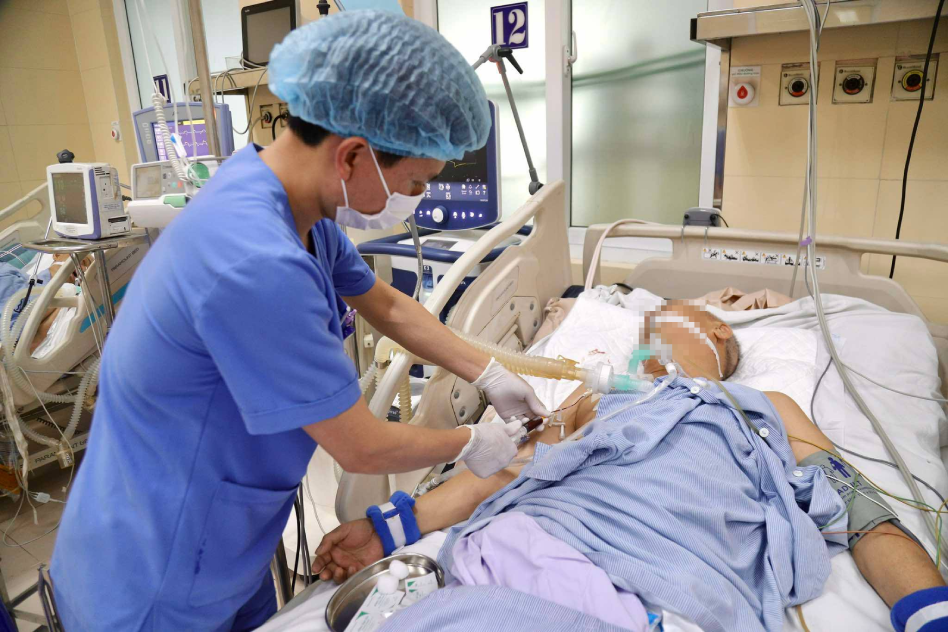
Nursing is a difficult job in intensive-care units, where there is only the sound of monitors, ventilators, and sometimes the sobs of people. Nurses at K Hospital often silently brush away their tears when facing patients, especially children, who are near death.
A man in his 60s, suffering from terminal lung cancer, was once admitted to the hospital’s emergency room with severe difficulty breathing. The medical team quickly decided to put him on a ventilator. Before the procedure, the weak patient expressed his wish to say his last words to his wife and children. However, due to personal reasons, his family members could not be present, and only his housekeeper was next to him.
The medical team tried to wait for family members, but his condition deteriorated. His eyes searched for a familiar face before he slipped into a deep sleep under the effects of intubation. Two days later, his family decided to take him home, and he passed away shortly after.
The team had earlier turned away in silence, hearts heavy with his unfulfilled final wish. That day, they all wished time could have slowed, hoping he might have found peace.
The ICU at K Tan Trieu Hospital is different from other units, as most patients there are in their final stages. Every decision by the medical team impacts not just survival but also the comfort of patients and their families.
Bui Van Quyen, a 37-year-old nurse with eight years of experience, said the case of the terminally ill man who could not see his family was one of thousands of near-death moments he has witnessed.
A typical Saturday night shift involves one doctor and three nurses taking care of 30 critically ill patients. Each nurse cares for 10 patients, performing complex tasks like ventilator support and continuous dialysis, or adjusting pain relief doses to control severe pain.
“Work here is far tougher than in other units. Patients are exhausted from chemotherapy and radiation, and their mental state is heavy. Some people I care for today are gone tomorrow,” Quyen said.
Working in the ICU requires nurses to be skilled as well as empathetic. Many patients, in agonizing pain, clutch nurses’ hands, begging for relief. In those moments, Quyen holds their hand, encouraging them to cherish each remaining moment.
A story of compassion
One memory etched in Quyen’s mind was a young girl from Hanoi with end-stage cancer. When transferred to the ICU, she was barely clinging to life. In her final days, her mother spoke to her constantly and decided to donate her corneas to give sight to others. When the girl passed away, the unit fell silent in mourning.
The ICU is often filled with the sounds of monitors, ventilators, and families’ choked sobs. Quyen and his colleagues have many times quietly wiped away tears, especially for pediatric cases.
In 2025, Quyen is one of two exemplary nurses at K Hospital who were honored on International Nurses Day (May 12). Yet, he humbly said, “All 18 nurses in our unit give their all to ease patients’ pain in their final days.”
Dr Do Anh Tu, Deputy Director of K Hospital, said: “Behind every treatment case are the gentle hands and resilient hearts of nurses. They turn pain into hope and fear into comfort.”
International Nurses Day, commemorating Florence Nightingale, the British social reformer who laid the foundation for modern nursing, is a time to honor the “white-clad angels” at K Hospital. Here, each day is a journey of compassion, where life and death intertwine yet human kindness remains warm.
Starting with a modest two-story building and just three doctors and one pathology researcher in the 1920s, K Hospital grew over a century to become Vietnam’s premier institution for cancer treatment.
K Hospital now employs 1,800 staff and serves 400,000 patients annually.
To meet the growing demand for cancer care, the Ministry of Health officially established K Hospital on July 17, 1969, ushering in a new era for Vietnam’s oncology sector and significantly contributing to public health protection and care.
K Hospital now operates three facilities with approximately 2,400 beds. The hospital is developing a fourth facility in Huu Hoa Commune, Thanh Tri District in Hanoi, spanning 9.3 hectares. The modern treatment center will feature a Proton therapy system valued at VND4,200 billion and other modern equipment.
At the ICU in K Tan Trieu Hospital in Hanoi, where patients battle cancer, doctors and nurses not only fight for life but also provide humane comfort in the patients’ final moments.
Phuong Thuy